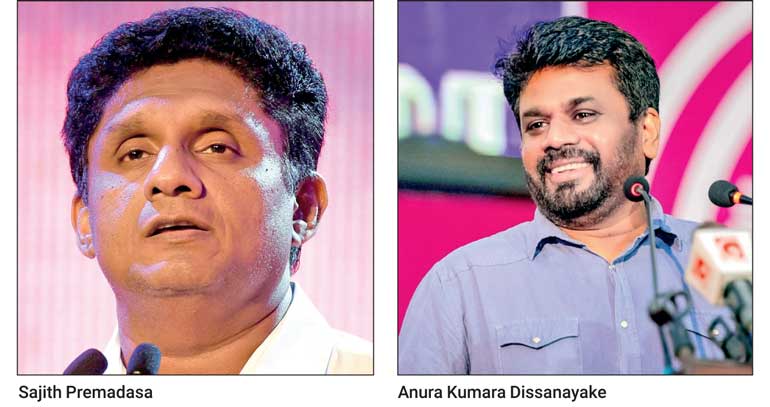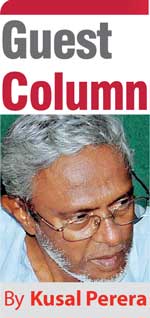Wednesday Feb 18, 2026
Wednesday Feb 18, 2026
Tuesday, 9 April 2024 00:30 - - {{hitsCtrl.values.hits}}

 Both leaders, Sajith Premadasa (SP) of SJB and Anura Kumara Dissanayake (AKD) of the JVP/NPP have said a few days ago they are willing to debate their economic programs on TV. Yet for now, neither they nor their parties are getting into the logistics of holding such debate in weeks to come. About a month and a half ago Harsha de Silva of SJB invited Sunil Handunneththi the shadow finance minister of the JVP/NPP for a debate on their economic program on TV, but Handunneththi’s position was, leaders as presidential candidates should explain their economic program to the people.
Both leaders, Sajith Premadasa (SP) of SJB and Anura Kumara Dissanayake (AKD) of the JVP/NPP have said a few days ago they are willing to debate their economic programs on TV. Yet for now, neither they nor their parties are getting into the logistics of holding such debate in weeks to come. About a month and a half ago Harsha de Silva of SJB invited Sunil Handunneththi the shadow finance minister of the JVP/NPP for a debate on their economic program on TV, but Handunneththi’s position was, leaders as presidential candidates should explain their economic program to the people.
That challenge was thereafter thrown at SP to debate the economic proposal with AKD. In social media it was being trolled SP is unlikely to face AKD in an open debate. When SP accepted the “challenge”, the JVP/NPP was hesitant in debating the economy publicly. A few days ago, economists in the SJB, Harsha, Eran and Kabir modified the structure of the debate into one between the Economic Council of the JVP/NPP and that of the SJB. Bottom line is, until the time this is written on Sunday last, there are only proposals for debate, vague acceptances with no further talk of details on date, time, the TV channel and the format of the debate.
A few days ago, in a video clip posted on “X” (previously Twitter) MP Harini Amarasuriya of JVP/NPP was heard telling a journalist, NPP Economic Program is not ready as yet, but would be out when elections are officially declared. On social media and in TV talk shows there are NPP economic experts introduced as members of the NPP Economic Council who give long explanations as to what their economic policy is and how the people would benefit in the “long run”.
Most now copy their leader AKD in avoiding the core issue with petty details. What is certain is, the JVP/NPP leadership would go about creating fancy ideas on political platforms, avoiding public debate. Meanwhile an urban middleclass youth who had usurped the right to be the NPP spokesman in English on economic issues, most recently left a comment on ‘X’ endorsing and appreciating the explanation given by Harsha about “social market economy” the SJB is proposing.
Let’s therefore get to “social market economy” from the “Blue Print” on SJB economic policy launched at a media briefing in early February. This Blue Print “provides a more detailed plan to move Sri Lanka beyond stabilisation towards sustainable and inclusive growth” and is introduced as their version 0.2. It is sub-titled as “Out of the Debt Trap & Towards Sustainable Inclusive Development – A Ten-Point Program for Sri Lanka’s Economic Stabilisation and Equitable Growth”.
Mentioned as a draft done by Harsha endorsed by their Economic Council and by their leader SP, it is very much what they have been doing when in the UNP under PM Wickremesinghe in their 2015 Yahapalana government. Excuse for their “yahapalana” failure even with an IMF imposed three-year program signed in June 2016, the Blue Print says there were political differences in that coalition government that prevented them from carrying out many reforms that would have otherwise led to economic growth.
Though these SJB economists now pose as perfect delivery boys in the next Government led by SP, their 10-point Blue Print once developed, would be a bundle of contradictions. This program spoken of by Harsha as one that would establish a “social market economy”, also says they stand for the right of the employer to hire and fire workers. This is how it is phrased in their Blue Print. “Sri Lanka’s labour market is also notoriously inefficient: public recruitment is excessive, and termination of employment in both the public and private sectors is almost impossible. …. a major disincentive for firms to expand operations in Sri Lanka as it is very costly to downsize if required. Urgent steps must be taken to create an efficient labour market by enacting new legislation.” (Section 09 / p-23)
A social market economy as Harsha explains is one that allows all citizens opportunities to make a decent living with no mention about fundamental and democratic rights. As their Blue Print says, with new law urgently required to allow firms to terminate employment as they please, will an SJB government ensure the fundamental right of workers guaranteed in Article 14.1(d) of the Constitution to join and organise trade unions?
If this “social market economy” is what the NPP economists endorse to say they are not for what President RW agrees with the IMF, there definitely is a contradiction between the JVP old guard and those NPP campaigners on AKD’s platform. The old guard still believes bits and pieces they have picked up as “socialism” in heavily regulated State controlled markets is the alternative to this open market economy. Neither AKD’s JVP/NPP election platform nor the Tilvin Silva led JVP old guard would want AKD to get into a debate with SP to have their contradictions exposed publicly that may devalue their collective claim for political power.
As it is, chances for a decent, intellectual public discussion on the economy between SJB and the JVP/NPP leaderships before TV cameras is therefore extremely remote. Even if by some miscalculation they do sit before TV cameras, it would be a verbal brawl to make them sound different to each other. But why wait for these party leaders to debate their out of shape economic programs between them, when they have not even had their program discussed and endorsed by their own party membership?
They need to have their party organisations adopt their program as the “national development program” and it is that “party program” that should be launched for public scrutiny and discussion. It is that they should distribute as their “national development program” to all professional organisations, trade unions, women’s, fisheries and farmer organisations, with a request for an opportunity to discuss their program.
That would be how a democratic political party would go about an election campaign with a program, well in advance. Total absence of such a democratic approach proves, these political party leaders nor their party organisations have had a taste of democratic organisational traditions. If they know what democracy in a political party is, no MoUs would be signed with desperate “Rajapaksa lackies” without any discussion and a decision within the party. It is worth even now for these political newcomers to learn how the LSSP in 1964 decided to coalesce with the SLFP.
With no democratic traditions in these “political clubs” and with no publicly declared and discussed development programme, how do People decide who should be voted for at the next election? This society too, especially the more vocal urban polity has opted for the easy way out. Go for a “new” cult. A new image on platform rhetoric. Never mind their past. It’s the past of the “old” leaders that matter. What it does mean is, the voter remains the same old voter, asking for a “change” in governance. In the “system” not even clearly identified.
It’s the voter that has to change. The voter should know, change in governance with no proper “development” program or hardly any with only new faces and new names, have always been a disaster. That change in the voter must come from the more concerned and organised urban segments. They should leave party labels and “new faces” aside and demand a social discourse on political party programs for future development of this country. How major issues not restricted to the economy alone, would be reformed and the State apparatus would be cleaned and made efficient for the benefit of the people, beyond stage performances.
A social discourse therefore should begin with the question “What is national development?” What does political leaders who ask for political power offer as “development” to People? “Economic growth” is not development. Development is not increase in GDP. It is not “per capita increase in annual income” per se. It is sustained improvement in “quality of life” of all Citizens across the country.
What do we mean by “quality of life”? Quality of life is not just about an income that can provide for an adequate daily calorie intake. Not merely about meeting expenses of basic needs like housing, transport, health, educational and other family needs. It is not about people being forced to work under threat of the employer having the sole right to terminate employment at his/her will and having to do overtime or work part-time to meet the basics, robbed of their leisure time. Development is about guaranteeing a decent regular income with efficient public transport, health, a national education system with equal facilities and equal opportunities for all and with other essential services. It is also about a life with time for leisure.
What therefore needs to be discussed about political party programs are, how they define “development” in them and how realistically they have planned for such development. Will any political party begin such dialogue with the voter?